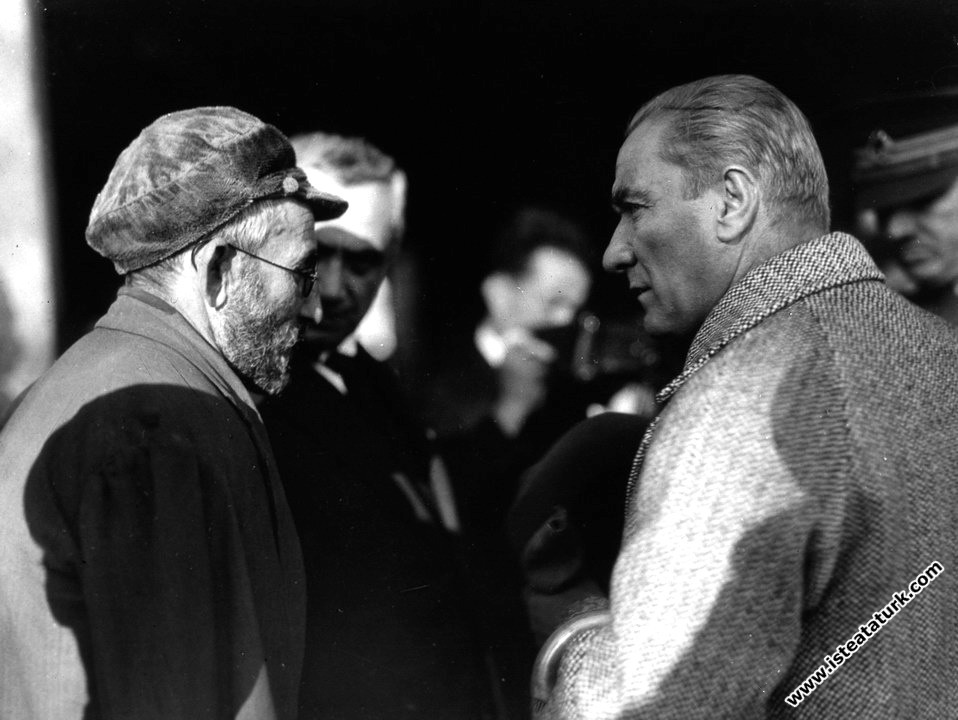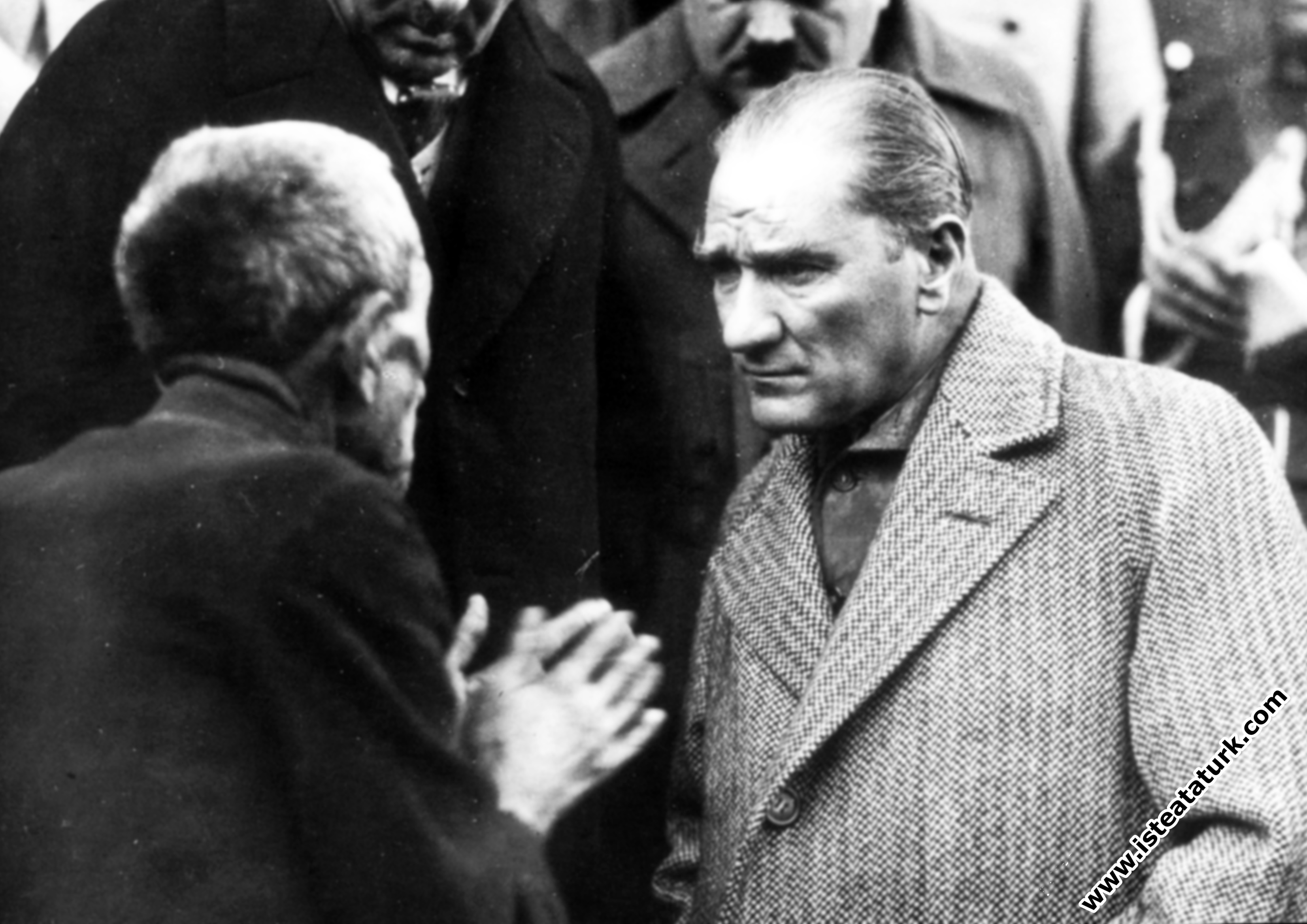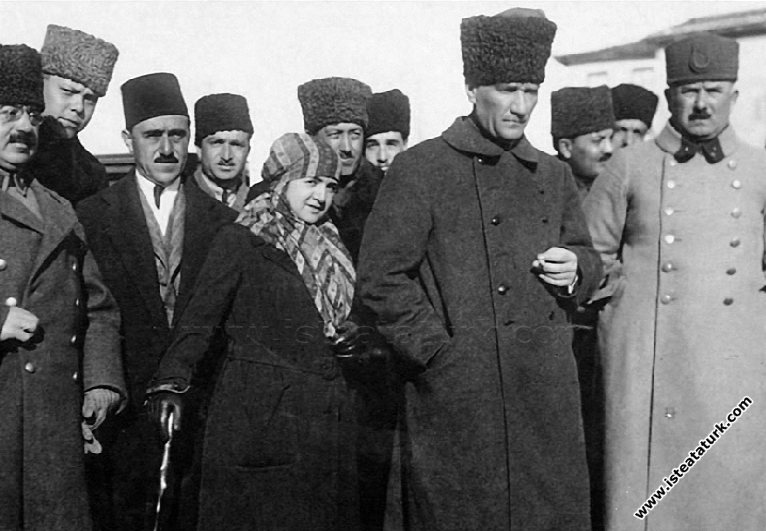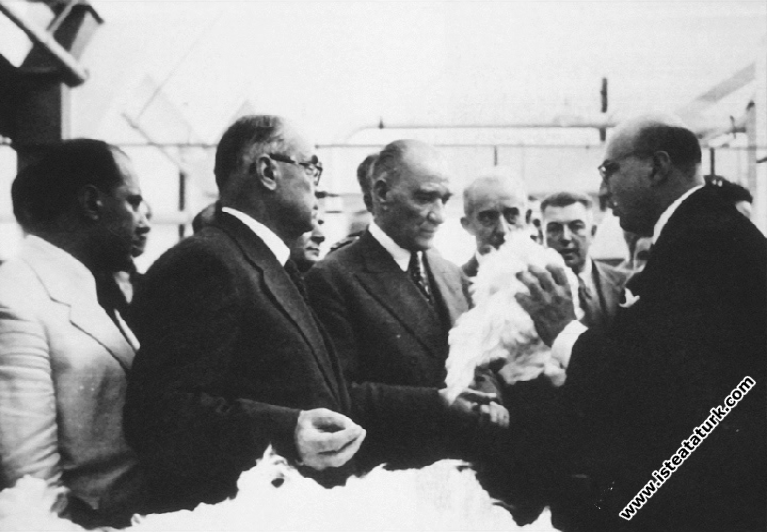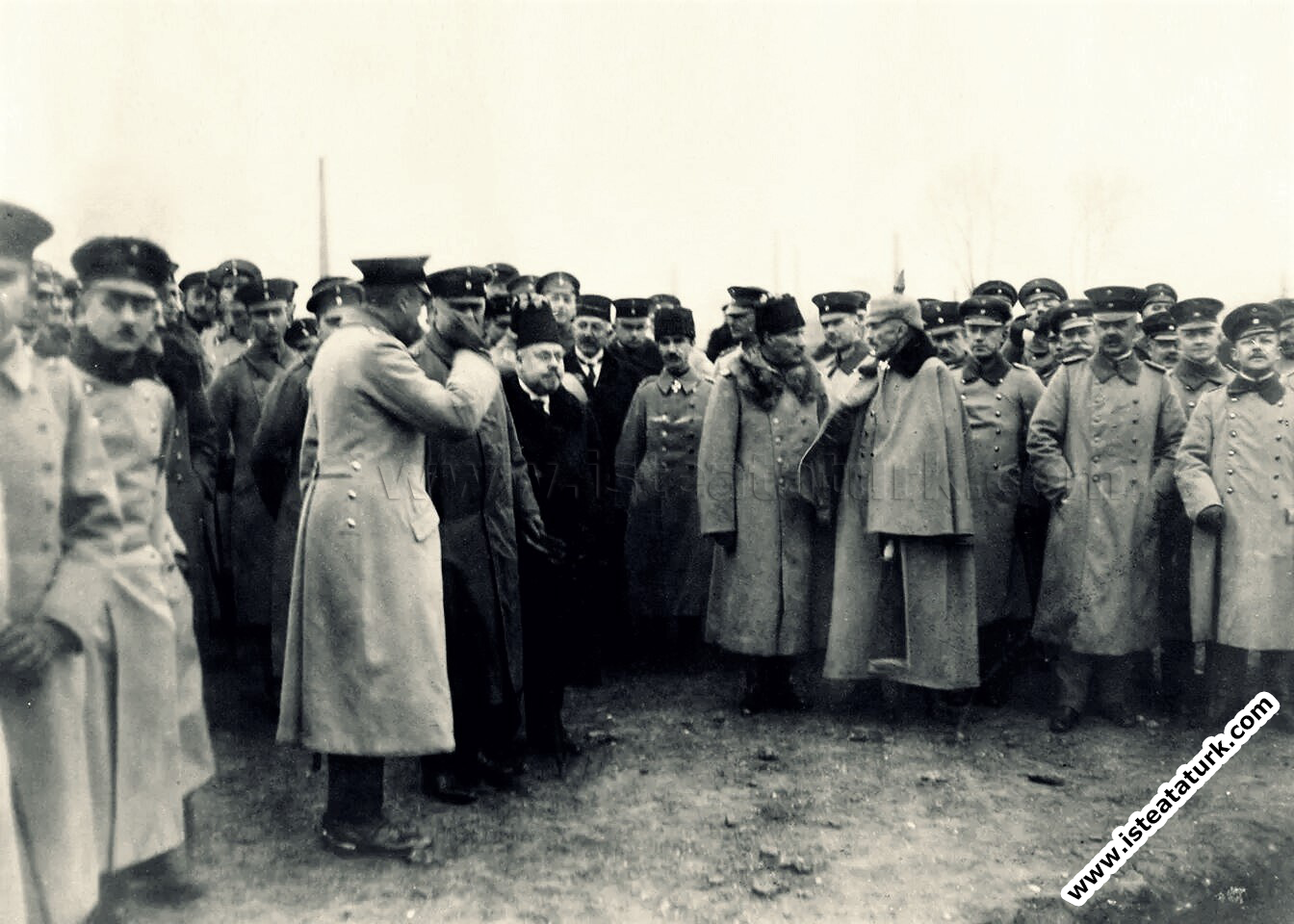
Germany - From Atatürk's Life: Travel to Germany
Character Size
Germany - From Atatürk's Life: Travel to Germany
FROM ATATÜRK'S LIFE: TRAVEL TO GERMANY
After the Suez Canal came under British control, the German Emperor II., who attached great importance to the Berlin-Baghdad axis to reach India. Wilhelm came to Istanbul in 1889 and 1898 and visited the Ottoman Sultan in his capital.
During the First World War, in October 1917, the Emperor came to Istanbul for the third time and invited the Sultan to his General Headquarters. Considering that the acceptance of this invitation and the return of the visit became inevitable, the Ottoman Government decided to send Crown Prince Vahdettin Efendi to Germany, as Sultan Reşat was unable to travel.
In addition, it was decided that Mustafa Kemal Pasha, who came to Istanbul and was under the command of the Commander-in-Chief, resigned because he could not agree with the Group Commander Marshal Falkenhayn on the strategy and tactics to be implemented in the Palestine Front while he was the 7th Army Commander under the command of the Yıldırım Army Group, to accompany the Crown Prince on this trip; He was asked whether he would accept or not. Atatürk, who saw this trip very interesting for himself, declared that he accepted it immediately. Naci Pasha (he was a colonel at that time), who spoke German very well and was Atatürk's teacher at the Military Academy, would go with the Crown Prince and act as an interpreter for him.
Atatürk was advised to visit and meet the Crown Prince before he went on a trip. One day, he and Naci Pasha went to visit Vahdettin. Atatürk describes this visit in his memoirs as follows:
“They put us in a room inside the palace, through the door leading to a hall covered with Arabian mats. The furnishings of the room, which was full of Redingot men, consisted of a sofa and an armchair on either side of the sofa. While standing in this room that we just entered, another man in redcoat appeared among the men in redcoats who looked very casual. Neither I nor my friend realized who this newcomer was, what he was and what he was meant to be. Includes entry; turned to our side. He sat on the right corner of the sofa. I sat in the seat opposite; Naci Pasha occupied the humble seat. This person closed his eyes once; he fell into a deep ecstasy, why then opened his eyes again, he kindly complimented us:
— I am honored with you; I am satisfied!
He closed his eyes again. As I was preparing to respond to these kind words, I realized that I was in the presence of a baffled (confused) personality; I hesitated when it was necessary to answer or not. I looked at Naci Pasha's face; he was also very stagnant. I chose to wait to see if he had the monopoly power (speaking power) once again. After a while he opened his eyes: - We're going to travel, right?
I'm so bored, so devastated (tormented):
“Yes, we will travel,” I said.
I must confess that I felt derakap (immediately) that I was dealing with a madman (crazy), but I forbade myself to engage in logical discussion (negotiation). I immediately stood up and said:
— Your Excellency, we will travel together; The trip will start in two days. You will be present at the station on Thursday evening; We will move from there.”11
They bid farewell to the Crown Prince and leave the room; On their way back in an ornate palace chariot, the following conversation passes between them:
"Atatürk: — Poor, miserable, glorious mercy... What could be wrong with these?
Naci Pasha: - It is,
Atatürk: - This poor man will be the sultan tomorrow, what can be expected from him?
Naci Pasha: - Never...
Atatürk: — We, who have reason and logic; we that We are people who understand the destiny, state and future of the country, what can we do?
Naci Pasha: — Power!..”
Thinking that this trip was a military trip in a way, Atatürk sent a message to the Crown Prince with his men to wear a military uniform. When they arrived at Sirkeci Train Station on Thursday, December 20, 1917, Atatürk, who saw that the Crown Prince was dressed in civilian clothes, said to İhsan Bey, the Crown Prince's attendant: “I sent a message for His Royal Highness to wear a uniform. Did you say?" says.
After Ihsan Bey replied that it was said, but the Crown Prince did not listen, he explains the reason as follows:
The Crown Prince was given the rank of Ferik (Lieutenant General), and later he was demoted to the Mirliva (Brigg.—Commander). For the same reason, he preferred to wear civilian clothes on this trip.
Atatürk describes the farewell ceremony held at Sirkeci Train Station as follows:
“The train we were going to get on was ready. A military detachment was in a ceremonial order (waiting to bid farewell) to the Crown Prince. I approached the Crown Prince. Deputy Commander-in-Chief Enver Pasha was also there.
— This soldier is ready to dissect you. I said greet them.
Vahdettin looked at me. With this view:
- How?
He meant it. I pointed out:
- You walk, we will follow you.
As Vahdettin passed in front of the soldier, he walked with both hands up, giving an unnatural and unconscious greeting. We went back and got on the train; As the train was about to leave, he had the windows of the hall we entered open open and said to Vahdettin:
I said, "Greet the soldiers and the people from this window."
— Why is it necessary? said.
— Yes, it is necessary!”2
Vahdettin does exactly what he says, pretending to bow to Atatürk's warnings without hesitation. After the train leaves Istanbul, he withdraws to the compartment prepared for him. After a while, while the train was moving through Thrace, Vahdettin invites Atatürk to the hall. Atatürk describes this meeting as follows in his memoirs:
“Honestly, this invitation pleased me. It meant that the first of the opportunities to closely examine the sultan of tomorrow was being bestowed. When I entered Vahdettin's living room, I found him standing, neat (waiting for me). He sat. He also showed me a place to sit. At this moment, I found the person who often spoke with his eyes closed in his palace in a completely different state. On the contrary, he had opened his eyes very strongly and was looking at me intently. As if making a speech, he made a statement like this:
— Excuse me, His Excellency Pasha did not explain to me who I was traveling with until a few minutes ago. However, upon the information I received after the train's departure, I realized that I was with a commander in absentia (without seeing his face) that I knew and appreciated very much. I know you very well. All your actions and achievements in Arıburnu and Anafartalar are fully known. You are a commander who saved Istanbul and everything, I am very pleased and proud to be traveling together (I am happy and proud).
Vahdettin uttered these words very slowly, but regularly (correctly). I was amazed, I answered as it was necessary; There were excellent, serious and sincere conversations between us.
Considering that what we had discussed for that night was sufficient, I said that I did not want to disturb him too much and took his permission. When I returned to the hall, I felt insirah (comfort of heart). I thought, this person must be smart. When we first met in Istanbul, the Crown Prince, who showed a strange state under the influence of the reasons and conditions (reasons and conditions) that were easy to understand by those who knew that period, after he left Istanbul, saw himself completely free and realized that his interlocutors were the most valuable security men, he changed his personality as he did. he no longer sees any harm in showing it as such. Accordingly, I had the hope that I could explain all the circumstances and necessities to him, and even be able to operate on some grounds that would be built by him.”3
Travel days follow each other. Atatürk has long or short talks with the Crown Prince every day; He comes to the conclusion that some things can be done with Vahdettin by enlightening him and supporting him with close and sincere help. He also tells this thought to Naci Pasha and his other companions; It indicates that it is a duty to prepare the Crown Prince in this way. Atatürk and his companions continue such contacts throughout the trip.
Finally, they arrive at a small town where the German Headquarters is located. A very ostentatious German unit, located opposite the entrance door of the headquarters, greets the Crown Prince. The Emperor welcomes the Turkish delegation at the entrance; they pass into a great hall; Hindenburg, Ludendorf and other headquarters are there. The Crown Prince presents those who are with him to the Emperor. During the presentation of Mustafa Kemal Pasha, the Emperor loudly said:
— "16th Corps... Mainfartalar!" says.
Upon these words of the emperor, all the German officers present there looked at Atatürk. Atatürk looks in front of him with an embarrassed and humble attitude... The Emperor who thinks that Atatürk may have made a mistake on this shy behavior:
— "Aren't you Mustafa Kemal, who was the Commander of the 16th Corps and made the Anafarta?" says.
Atatürk gave a positive answer to this question of the Emperor.
The next day they visit Hindenburg and Ludendorf. Atatürk describes these visits in his memoirs as follows:
“We were in Hindenburg's tiny office. The Marshal was sitting at his desk and in the armchair to his left, Vahdettin, and next to him was Naci Pasha, whose language was at the same level (degree). I was in the chair that coincided with Hindenburg's right. The Crown Prince and Hindenburg were talking to each other. Although it is not customary to talk about very important things in such a short and ceremonial interview, Hindenburg was saying very consoling words to the Crown Prince, of course, to the whole Turkish nation in his sign, and the Crown Prince thanked this consolation statement.
I wanted to be convinced that the words I heard from Hindenburg's mouth were finally being spoken out of courtesy because he was kind and hospitable. Otherwise, the praise of the statement (understood from the words) was of a nature that would make me happy. I did not find it appropriate to participate in the debate; on the contrary, I was inclined to cut the interview short; it was so.
He received Vahdettin in Ludendorf with great courtesy and care. It can be said that he also gave consolation explanations on the issues that Marshal came into contact with. He especially talked about the brilliant attack they started against the allied armies on the northwestern front in those days. We actually knew about this attack. But I was looking forward to hearing from Ludendorf's tongue (from the mouth) the result that the offensive could achieve.
I saw that this is not the object of the discussion. To say that the German army was attacking was to give assurances that would raise the morale of the German nation and army and all the allies. To clear my doubts, I asked the General a quick question:
— How far will the offensive forces finally go?
Thus, when asked by an officer accompanying the Crown Prince, Ludendorf graciously withheld (interrupted his words); He thought for a while, looked at me a little bit, and said:
"We are attacking, the result will be shown by the hadith.
I replied:
— I think it is not necessary to consider the manifestation of hadith and fortune in order to understand what the outcome of the ongoing offensive might be; because the attack made is ultimately a “partial” (limited-targeted) attack.
Ludendorf looked at me again. He understood very well what I meant. Positive, not giving a negative answer, remained silent.
The discussion remained here and the visit was finalized.”
At the hotel where they stayed the day after the visit, Atatürk tried to explain to the Crown Prince the illogicality of the Turkish Commander-in-Chief in linking the future of the country with the German victory in the face of Ludendorf's trust that left the fate of the attack to God. The Emperor comes to visit the Crown Prince.
Atatürk describes this visit as follows:
“We appealed to the future of the emperor (rushed to meet him). The Kaiser entered the hall. We all sat together. The Emperor was speaking in a gentlemanly manner, talking about the fact that the loyal and devoted Ottoman State was a very valuable German ally, and that his Deputy Commander-in-Chief Enver Pasha was working by understanding the value and height of this friendship, and that the German Commander-in-Chief and Military Staff had an extraordinary security and confidence in this distinguished person.
I am on the right of the Crown Prince. Naci Pasha was right in front of us, the Emperor was on his left. The following question was asked to the Emperor by Vahdettin in the Naci Pasha language:
— The splendid statement of Turkey, which spoke of loyalty and loyalty to Germany, and that its close German allies would attain happiness, aroused great relief and consolation in the helpless people who were in a position to think about the future of the Ottoman Empire. However, I need to explain one more point clearly, disregarding the situation from general consideration and examination. The coups against Turkey's heartland are progressing without being stopped. If these coups succeed, Türkiye will be destroyed. I could not listen to your statement, which is sufficient guarantee for the arrest of these coups. Could you please enlighten and satisfy me a little in this regard?
Upon this question, the Emperor immediately stood up from his chair. He addressed something like this:
— Turkey's venerable Crown Prince, I understand that there are those who encourage (confuse) your mind. After I, the Emperor of Germany, told you about strength and success, would you have any doubts or not?
The Crown Prince I was with gave a positive answer and added that his anxiety was not lost.
The Emperor no longer sat in the chair from which he had risen... And graciously hinted that he would leave us. He walked towards the door of the hall. Vahdettin and after him we took the Kaiser out of the door of the hall. The Kaiser would walk down a corridor to the left. I realized that I didn't like the Kaiser, so I stood a little further down the wrong (reverse) corridor. The Emperor, shaking the hands of the Crown Prince and then Naci Pasha, who was close to him, looked at me, who was far away, and started walking in the direction of the corridor he was in.
He didn't shake my hand. The Emperor had the right. Would he go to the Crown Prince's feet to shake the hand of any general accompanying him? Isn't it necessary for this general to take the honor of being shaken by the Emperor a little (hurry up a bit to win)?
I confess my fault. I don't know why I was stagnant, impotent, fixed and absent-minded. The emperor returned again after two or three marches. He approached me:
"Excuse me, I didn't shake your hand.
I stretched out my hand, and I received very kind and gracious compliments.”4
After these visits, the Emperor invites the Turkish delegation to his table for dinner. Atatürk's memories of this invitation are as follows:
“There was a prince opposite the Kaiser, Vahdettin on his right, the deceased Berlin Ambassador Hakkı Pasha on his left, and I on the prince's left. To my left was Ludendorf. Ludendorf was talking to me in French. Emperor, to Ludendorf in German:
— Talk to the man on your right! said.
Ludendorf:
- I'm doing it. He gave his answer.
Of course, since I knew enough German to understand these utterances, I went to the Emperor's warning and Ludendorf's reply. Ludendorf, whose mind was tired from the administration of a very large operation, could not find a serious discussion topic that would stick in my mind during the meal.
Dinner is over; Adjacent to this hall was another hall, which looked almost like a large part of it. Some of us who were present at the table went there. The Emperor, Hindenburg, Ludendorf, a person we think is the German Prime Minister, on our side, the Crown Prince, Hakkı Pasha is deceased and we...
The Emperor is standing in a corner talking sweetly to the Crown Prince. I am in front of a high figure, very majestic and lively, who, in his noble eyes, seems to understand the truth (truths), but is reluctant to tell every interlocutor what he understands: Hindenburg!
I wanted to meet with Hindenburg, I was trying to refer him to the sweet conversation (conversation) ground he had contacted, especially when we went to visit with the Crown Prince.
During our visit, the Marshal had said that the situation in Syria had been improved and that a new and fresh cavalry division had been imported into the battlefield recently. However, what this great man was talking about was of course the content of the report given by the commanders there. In fact, this cavalry squadron in question was the squad that was requested to be sent to this group to reinforce the Yıldırım Group when I was still the 2nd Army Commander. Before I became the Commander of the 7th Army, a lot of work was done on the formation and supply of this cavalry division. However, this mobile force that could be gathered was so bimecal (weak) that it was necessary to first feed the lagar animals on the pastures around Ras al-Ayn and then re-examine whether they became capable of being used. When I became the 7th Army Commander months later, I investigated whether I could benefit from this division. One serious report I received was that the faction was not a force. What I heard from the mouth of Hindenburg at the German headquarters was that this division was included in the battlefield and the situation was improved. I told the Marshal of this adventure and said:
— The words I will say may not match the content of the reports you receive. But you can be assured that it is the truth. Accept this.
Then, Marshal, you are making an important attack, and I don't think you're relying too much on it; Can you tell me alone, what is the goal and purpose you hope for safely?
Could the great and prudent soldier answer my question? I shouldn't have expected that from him anyway. This, perhaps, was due to my somewhat arrogant state of mind, possibly due to the delicious champagnes served to us at His Imperial Highness' table.
The Marshal seemed to listen attentively to what I had to say; but he gave a very simple and cute answer: (There was a small table in the middle of the room with various cigarettes on it.)
"Your Excellency, may I offer you a cigarette?"
Hindenburg had an answer to everything. We went to the table in the middle; He handed me a cigarette with his own hand. It turns out that the Emperor who spoke with Vahdettin was interested in our contact and response. He asked the Marshal in German:
- What is he saying?
The Marshal replied:
- Something!
After I lit my cigarette, I left Hindenburg and went to Vahdettin, who spoke to the Emperor:
— Do you understand the truth? I asked. Your addressee is the Emperor of Germany. Did he say a single word to explain the concerns I have presented to you?
- No! said.
— Keep talking, I said, and talk seriously; do not hesitate to raise all concerns to the Emperor; I am sure he will not be pleased with you. But at least he will believe in the existence of those who have seen the truth in Turkey.
The Crown Prince, with an innocent attitude:
"I'm doing that," he said.
A program was prepared to increase the confidence of the crown prince and his entourage in the German army by showing the troops at the front. One goes to a large headquarters, where the German Commander explains the situation of his unit with bright words to the Crown Prince on well-prepared, colorful maps. Listening to this beautiful explanation, the Crown Prince asked Mustafa Kemal Pasha softly: "What do you think of this?" says.
Atatürk replied: “Tell me what you want to see, in good condition, on the field”.
They go to the front. There, they come across a pre-prepared travel plan for them.
Atatürk says: "Let's leave this plan and go to the place I will show you". Thereupon, Atatürk describes the development of events as follows in his memoirs:
“At that moment there was a commotion. Vahdettin walked in the direction to which he was dispatched, subject to the ready-made sketch. A soldier's stubbornness woke up in me. I did not follow them. Trusting the indication of the map we had acquired, I walked to a point in the line of fire and came to the base of a tree behind the line of fire. There, a young officer was watching over the tree. There were also German officers accompanying me. Watching officer came down. He told about his meşhudat (what he witnessed, that is, what he saw).
"Excuse me," I said, "I'm going to climb this tree."
— There, there!
They replied; I went out and saw exactly what the officer said. But the main point to be discussed was the situation against this observed situation; I asked for him:
— Could you please tell me what is your strength, equipment and reserve in the face of this enemy situation?
The naive officers and commanders of the line of fire told the truth to a commander of the Turkish allies. The truth was this: the infantry forces had almost reached an insufficient level. They spoke of a force they had to use, such as infantry, when they were cavalry; it, too, had emerged from the quality and quantity (quality and quantity) that could be called prudence after the first line's foundations. After receiving this information, I said to them, very imaginatively (astonished), biperva (without hesitation):
- Then you are in danger!
"So... they said."
The conversation between Atatürk and a German Corps Commander on the day of this trip is interesting. The German Corps Commander asks Atatürk:
— Are you the aide of the Crown Prince?
- No!..
— On what occasion are you accompanying him?
"For taking on such a task.
“You have a very good understanding of military situations. Did you command any forces in Turkey?
The German General was astonished when he learned that Atatürk was in the divisions, corps and army commands in Turkey:
— Excuse me, we've been addressing you wrong until now. So you are “Your Highness”; says.
One night in Alsace, they are invited to the Governor's house. While Vahdettin and the Governor are sitting at a table and talking, the Governor asks Vahdettin a question about the Armenians. After Vahdettin gave some answers, he called Atatürk to his side and said to the Governor:
“— A commander who has been on the fronts and knows the country is with me; If you want, listen to him too!” says.
Atatürk, who was very surprised and angry when the governor talked about the terrible rape of the Armenians by the Turks, to the Crown Prince of a friendly and allied state, who is the guest of Germany, who will be the sultan tomorrow:
“— I was stunned by the interview ground between the Crown Prince of Turkey and a governor of Germany, which I do not doubt is valuable. First of all, I would like to understand from you: Where does the idea of speaking in favor of the Armenians, who claim to exist in what period of history and try to seduce the world to revive this existence, against Turkey, which is your ally and destroyed its material and moral existence for the sake of this alliance, comes from?
Your Excellency, we are a delegation wandering around the fronts; We have not come here to talk about the Armenian question, but to understand the true situation of the German army, which is our ally and on which we rely; we understood it; We are returning to our homeland with sufficient knowledge.” He silences the Governor.
Then they tour the Croup Factory; They are invited to dinner at the factory owner's magnificent castle. Finally, they return to Berlin and are hosted at the Adlon Hotel as the Emperor's guests. Here, Vahdettin organizes press conferences. He speaks by being inspired by the ideas Atatürk suggested to him during the trip. This makes Atatürk happy. When they are alone at the end of a meeting, he says to Vahdettin:
“ — You know Ottoman history; There are some phases of this history that make you fear and worry, and you are right. I will tell you something, to the extent that I will give my life to you (I will combine it with your life); would you be satisfied?" says.
After Vahdettin said: "Tell me!..", the following conversation takes place between them:
“Atatürk: — You are not the sultan yet, but you saw in Germany that the emperor, the crown prince and princes are always on a job. Why would you stay away from all business?
Vahdettin: — What can I do?
Atatürk: - As soon as you go to Istanbul, ask for an army command. I will be your chief of staff (chief of staff).
Vahdettin: - Commanding which army?
Atatürk: — Commanding the fifth army**...
Vahdettin: - They won't give me this command.
Atatürk: - You ask for it.
Vahdettin: — When I go to Istanbul, I think about it.”
The trip to Germany has an important place in Atatürk's life as it was his first close contact with the Ottoman Dynasty. The trip covers the last days of 1917 and the first days of January 1918. In those days, the USA also entered the war against Germany. Despite Russia's withdrawal from the war, German victory is now a dream. Atatürk is aware of this. Baghdad, Jerusalem fell. The British are preparing to attack in Palestine. In this case, according to Atatürk, the strategy to be implemented is to defend the Anatolian lands with our last strength by pulling the remaining forces towards the Taurus Mountains. Along the way, he tried to commit this idea to the Crown Prince. What Vahdettin was able to do as soon as he became the sultan was to abolish the Deputy Commander-in-Chief and demote Enver Pasha to the position of Chief of Military Staff. But this did not change anything in practice.
It can be thought that Atatürk's positive impact on Vahdettin during his trip to Germany played a part in his appointment as the 9th Army Inspector.
1 Falih Rıfkı Atay. What Atatürk Told Me, Hisar Printing House. Istanbul. 1955. p. 26 and more.
2 a.g.e.; s. 26-44.
3 a.g.e.; s. 26-44.
4 a.g.e.; s. 26-44.
5 a.g.e.; s. 26-44.
** The 5th Army was the army under the command of Liman Von Sanders and tasked with defending the Straits.
Retired Brigadier General Fahri Çeliker
Source: ATATÜRK ARAŞTIRMA MERKEZİ DERGİSİ, Sayı 12, Cilt IV, Temmuz 1988
